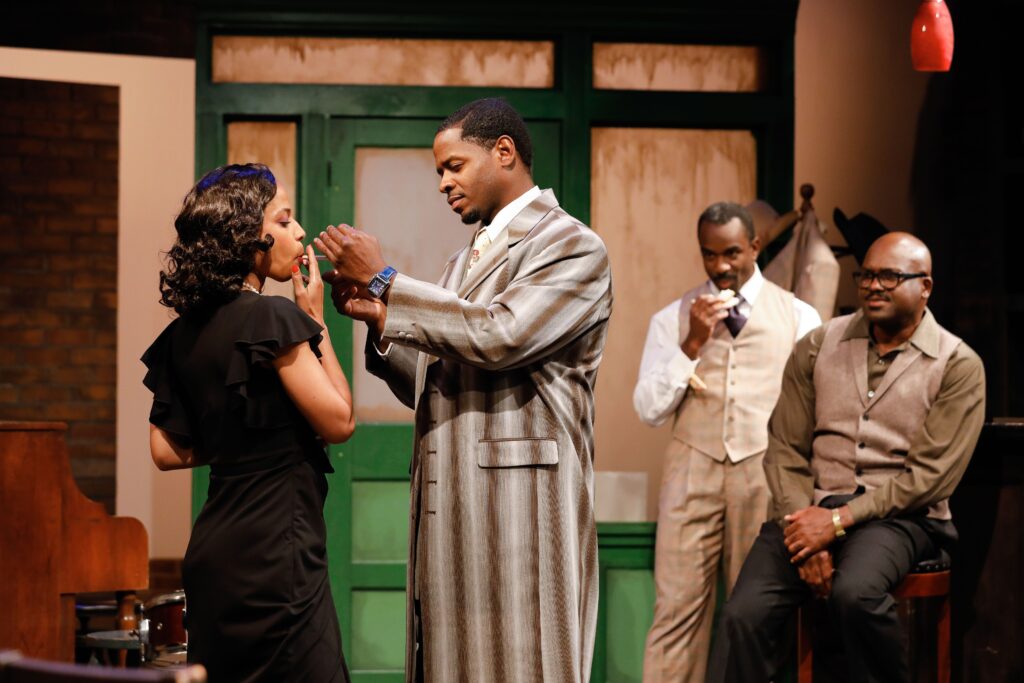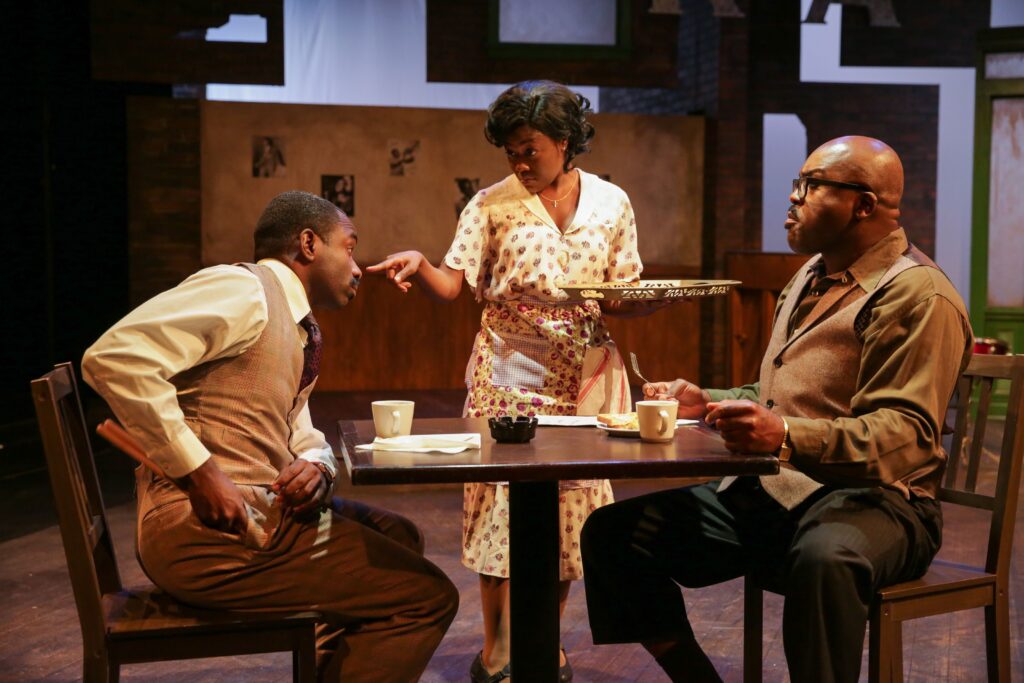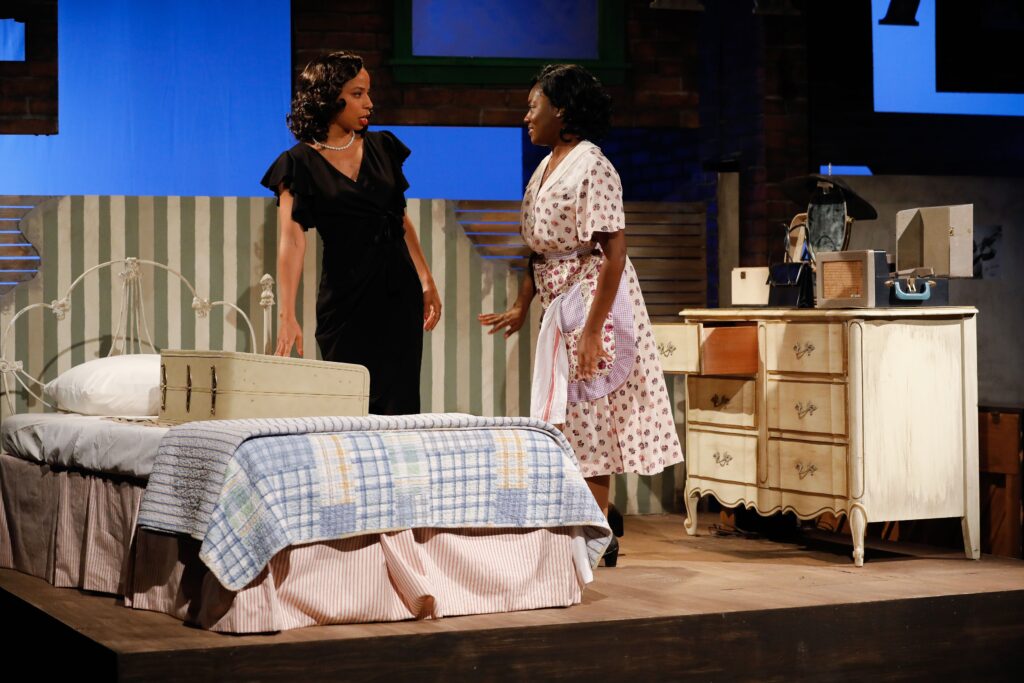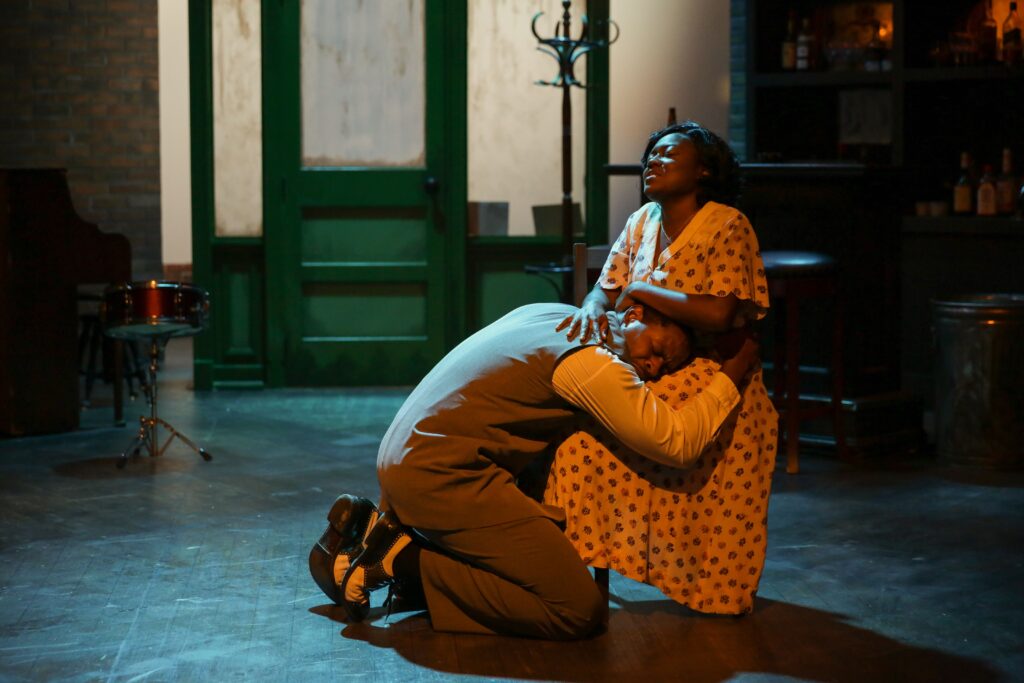
Paradise Blue – Elyse Joyner and Logan Pitts, Co-directors; Janie Howland, Scenic Designer; Nia Safarr Banks, Costume Designer; Aubrey Dube, Sound Designer; Toni Sterling, Lighting Designer. Presented by the Gloucester Stage Company, 267 East Main Street, Gloucester through September 18
by Mike Hoban
There’s no shortage of compelling human drama in Paradise Blue, the ambitious 2018 play by Obie Award-winning playwright Dominique Morisseau, now playing at Gloucester Stage. The noir-tinged play explores the lives of the denizens of Paradise Blue, a jazz club nestled in the entertainment district of Paradise Valley in Black Bottom, a predominantly black neighborhood in Detroit in the late 1940’s. But the drama inside the club pales next to the looming threat that lies outside the club’s door – the impending gentrification that will destroy the neighborhood in the years to come under the guise of “urban renewal”.
“See if this plan to clean up the city don’t mean to clean us out,” says one prescient character to his bandmate. “Get rid of all the n***ers. Just like the Mayor say in his campaign – we the blight he talkin’ ‘bout.”

Blue (Durrell Lyons), a gifted bebop trumpet player and leader of the house band quartet, is the owner of the club, which is losing customers to the other neighborhood jazz joints. The poetry-loving Pumpkin (Destiny Dashuan Washington) is his Girl Friday, serving as both the cook/maid of Paradise Blue and the romantic partner/caretaker of Blue himself. Not long after the play opens, we learn there’s trouble in Paradise, as Blue has let the quartet’s bass player go after a dispute over money and stage time. P-Sam (Darian Michael Garey), the drummer, is livid, particularly since without a bassist, there’s no band, no paycheck – and no women. Pianist and longtime bandmate Corn (Dereks Thomas) staunchly defends Blue, seemingly putting loyalty above his own best interests. When Blue comes into the conversation after meeting with city officials about the possibility of selling the place as part of the newly elected Mayor Cobo’s plan to clean up the “blight” in Black Bottom, the temperature in the room gets turned up to high. And when the widowed bombshell Silver (Alexandria Danielle King) strolls into the room – complete with a walk that would stop rush hour traffic on the Mass Pike – the thermometer explodes. “Woman like that… lookin’ the way she lookin’…all on her lonesome…,” says Blue to the men after she walks away to the room above the club he has rented to her. ”Them kinda women ain’t nothing but trouble. You betta believe that.”

But Silver may be the least of his worries. On top of all the other stresses with the club, Blue struggles with “demons” in the form of his unresolved feelings around his mother’s violent death at the hands of his father. He believes he can’t escape from those demons as long as he stays at the club his father once owned, but he also feels a sense of betrayal to the club’s legacy as he contemplates his decision.
While the main theme of whether or not Blue will sell the club and the greater implications of that decision runs throughout, the play is chock full of subplots. P-Sam, already at odds with Blue, has his eyes on Pumpkin, despite her exhortations that she’s just not interested in him. Corn, a lonely and emotionally vulnerable widower himself, falls under Silver’s spell. And as the pressure mounts on Blue and his mental health spirals downward, Pumpkin weighs whether she should stay with her codependent lover or do what’s best for her. As interesting as some of the plotlines may be, often they don’t go anywhere or are not sufficiently fleshed out. We’re told about the demons that haunt Blue, but it’s never really clear what that looks like except in flashes late in the play. The same can be said of the abuse of Pumpkin that drives her later actions. Fortunately, Morisseau (who was awarded a MacArthur Foundation “genius” grant in 2018) is masterful at both dialogue and creating absorbing vignettes, and the scene between good girl Pumpkin and “spider woman” Silver is alone worth the price of admission.

Paradise Blue is also buoyed by a solid cast. Washington is terrific as the sweet but conflicted Pumpkin, and her growth from the unsteady but impassioned readings of Harlem Renaissance poet Georgia Douglas Johnson to blossoming as a vocalist is an apt metaphor for her transformation as a woman. King knows how to bring the heat as Silver, but also effectively conveys the intelligence combined with street smarts that make Silver’s character as cold and calculating as any corporate shark. As P-Sam, Garey is alternately a slick hustler and the voice of reason, Lyons is at his best when spewing contempt at the sultry Silver, and Thomas’ performance as the dedicated friend is both subtle and endearing. The simple but authentic set design by Janie Howland lovingly replicates a 40’s jazz club, and the bedroom scene change is brilliantly efficient. Kudos also to costume designer Nia Safarr Banks and her eye for detail in recreating 40’s style, especially Blue’s wardrobe and way cool spats.
Paradise Blue may not be on a par with Morisseau’s brilliant Skeleton Crew,(which ran at the Huntington in 2018) but the performances and storylines make for a solid evening’s entertainment, and it’s great excuse to take a late summer ride up to the Cape Ann coast. For tickets and information, go to: https://gloucesterstage.com/paradise-blue/

